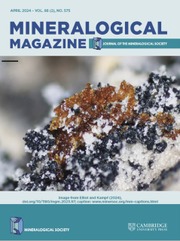Article contents
Tavistockite and bialite discredited
Published online by Cambridge University Press: 05 July 2018
Summary
Specimens of tavistockite fall into two groups: true tavistockite from the George and Charlotte mine, Tavistock, Devon, and wavellite from the Stenna Gwyn mine, St. Austell, Cornwall. Both were sold as tavistockite by the discoverer, Richard Talling.
Tavistockite proper is a fluorapatite, as shown by optical and X-ray examination, and the alumina and water in the original analysis are certainly derived from kaolinite with which the apatite is intimately associated.
The published optical properties attributed to tavistockite were determined by E. S. Larsen on Stenna Gwyn material, and are those of wavellite.
Re-examination of a portion of Buttgenbach's type bialite, which he related to tavistockite on optical grounds, shows it to be wavellite.
- Type
- Research Article
- Information
- Copyright
- Copyright © The Mineralogical Society of Great Britain and Ireland 1969
References
page 123 note 1 A. H. Church, Journ. Chem. Soc. (1865), 18 (N.S. 3), 263.
page 123 note 2 Dana Syst. Min., 5th edn (1868), p. 582.
page 123 note 3 A. W. G. Kingsbury, Trans. Roy. Geol. Soc. Cornwall (1959 for 1955-6), 19, 47.
page 124 note 1 Op. cit., p. 48.
page 124 note 2 A. W. G. Kingsbury, Min. Mag. (1961), 32, 922-3. The date 1864 on p. 922, I. 8*, relates to this same invoice and should read 1866.
page 124 note 3 J. H. Collins, A Handbook to the Mineralogy of Cornwall and Devon, 1871, p. 100.
page 124 note 4 Descriptive Catalogue of Minerals, being the Collection of William Nevill, F.G.S., Godalming, Surrey (London: printed by Taylor and Francis), I872 , p. I48 , no. 3579- Much of NeviU's collection was acquired by Henry Ludlam, who bequeathed his collection to the Museum of Practical Geology (now the Museum of the Institute of Geological Sciences).
page 124 note 5 Dana Syst. Min., 7th edn, vol. 2 (1951), p. 125 (under fluellite).
page 124 note 6 See p. 123, n. 3.
page 126 note 1 R. E. Grim, Clay Mineralogy (McGraw-Hill, 1953), p. 296 ff., gives several references.
page 126 note 2 E. S. Larsen, The microscopic determination of the nonopaque minerals. U.S.G.S. Bull. (1921), 679, 142.
page 126 note 3 Dana Syst. Min., 7th edn, vol. 2 (1951), p. 906.
page 126 note 4 A. N. and H. Winchell, Elements of Optical Mineralogy, part 2 (4th edn), p. 229.
page 127 note 1 W. R. Andersorn, B. Stringham, and J. A. Whelan, Amer. Min. (1962), 47, 1305.
page 127 note 2 H. Buttgenbach, Ann. Soc. Géol. Belgique, Publ. Congo Belge (1929), 51 (for 1927-8), C. 117.
page 127 note 3 BM 1929, 85. Obtained by exchange from H. Buttgenbach.
page 127 note 4 A. H. Church, Journ. Chem. Soc. (1873), 26 (N.S. 11), 110.
- 2
- Cited by


